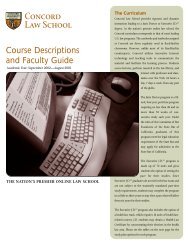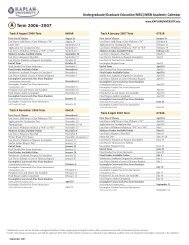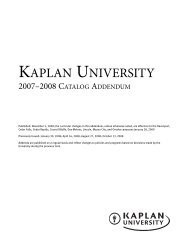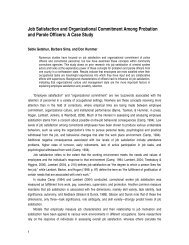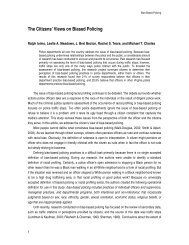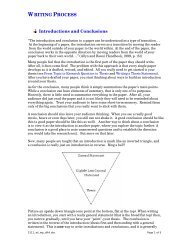Adult Probation Department Mental Health Unit: An Outcomes ...
Adult Probation Department Mental Health Unit: An Outcomes ...
Adult Probation Department Mental Health Unit: An Outcomes ...
- No tags were found...
You also want an ePaper? Increase the reach of your titles
YUMPU automatically turns print PDFs into web optimized ePapers that Google loves.
The distribution of types of offenses was found to be similar to that of cases seen in Intensive Drug<strong>Probation</strong>, Intensive <strong>Probation</strong> Services, and Domestic Violence. Therefore, the MHU case managementtechnique can be applied to all types of offenses.This study shows that the MHU manages individuals with a range of major mental illnesses.Schizophrenia, major depression, bipolar disorder, and schizoaffective disorders constitute the diagnosticclassification for many probationers in the unit. The MHU officer provides unique and specialized treatmentthat includes case management and use of varied communication styles. A brief description ofcommunication styles and case management objectives follows.Case Management and CommunicationCase management within the MHU has had to incorporate all of the legal aspects expected of everyprobation officer and the varied roles a community mental health worker uses in working with the seriouslymentally ill. Officers working in the mental health unit become the point of contact for legal cases as well asthe broker for mental health services and other mandated services; therefore, officers use their knowledgeand expertise in communicating with attorneys, public defenders, judges, social workers, psychiatrists, andpeople in other disciplines. MHU officers must understand their audience and be able to articulate amessage effectively to achieve a particular outcome.As a key element of the MHU approach, officers’ facility with various communication styles helps themget their message across effectively and understand the other parties’ interests. The communicationexpertise officers’ display comes from knowing their audience and tailoring the message to the individual,whether it is a client, attorney, psychiatrist, community mental health caseworker, public aid caseworker, ornursing home admissions director. This skill guides MHU officers in discussing a client’s noncompliance or aproposed plan of action.In working with a client who is severely mentally ill, the traditional probation approach is not ofteneffective because the illness may affect the client’s comprehension of information. Most of the clientssupervised in the MHU have both a mental illness and a substance abuse problem. Officers may have tohelp reduce clients’ paranoia and compel them to participate in the planned interventions. MHU officersmust step into the role as mental health workers and communicate to the doctor the symptoms they observeand the urgency of moving the appointment to a sooner date. Lastly, officers must communicate to thedetoxification center the nature of the client’s mental health issues so they do not become a destabilizingissue during detoxification. Our end goal would be to manage the situation so it doesn’t rise to a level thatwould require going back to court.MHU officers must harness all the information to inform the judge where the client experiencesproblems and where they are succeeding. A judge has to rely at times on our assessment of the situation,which incorporates the information from psychiatrists, caseworkers, housing staff, and substance abuseproviders. This information is essential for giving the judge a balanced picture of the probationer and his orher issues. At times it may be necessary to factor in the client’s criminogenic factors that would interfere withan ideal recommendation by the officer. It is this level of competence the officer must demonstrate whencommunicating and interacting in the courtroom. In an arena where evidence, allegations, and witnesses11



